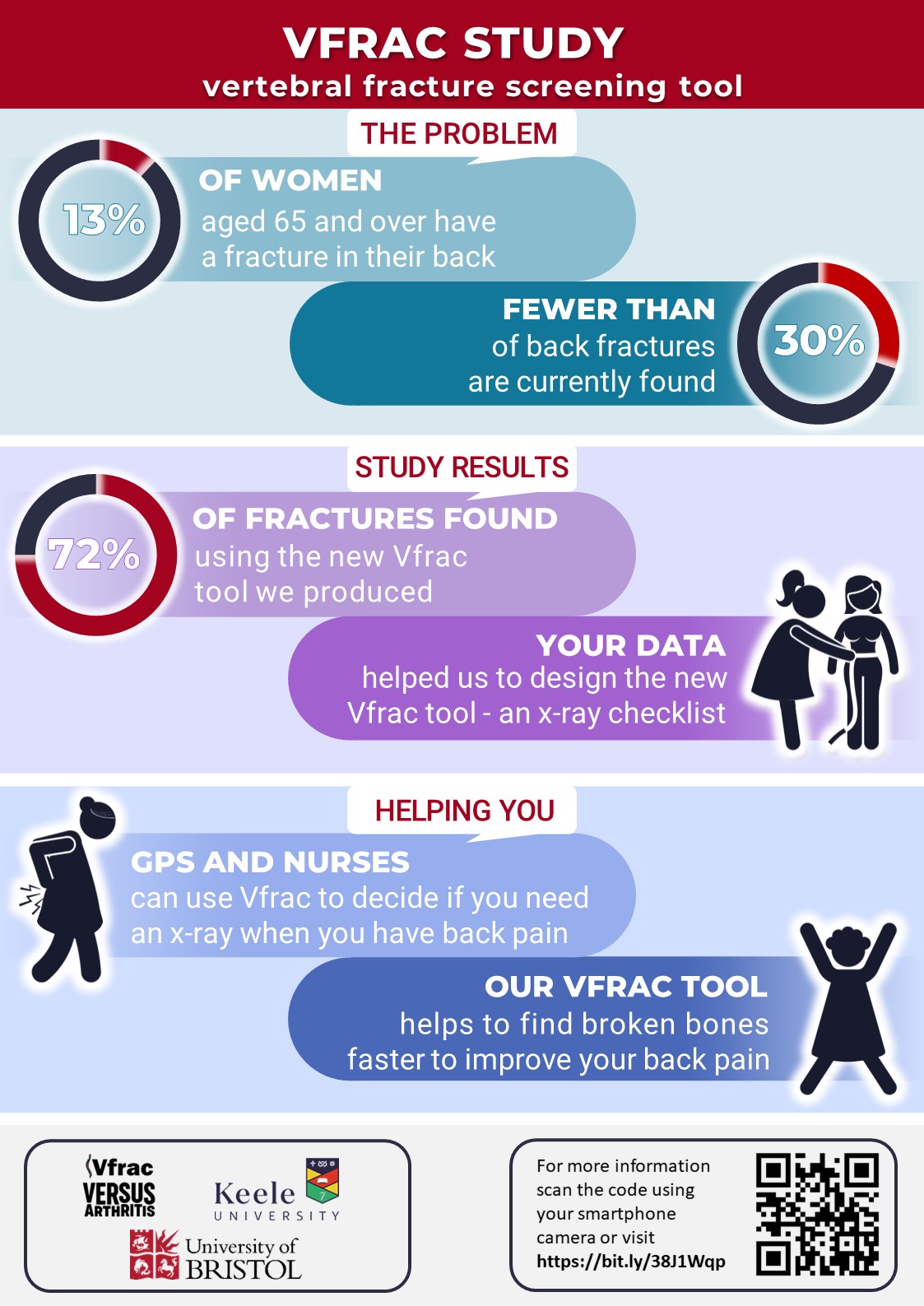Vfrac Study
Production & evaluation of a clinical tool to screen older women with back pain for vertebral fractures
Background and study aims
Osteoporosis (weak bones) is one of the most common musculoskeletal conditions in older women. Osteoporotic vertebral fractures (broken back) are of particular importance, as they identify people at one of the highest risks of future fracture. Despite this, less than a third of people with vertebral fractures are correctly diagnosed and managed. The main reason for this failure is lack of awareness by healthcare professionals over who should have spinal X-rays. We have carried out three relevant research studies in this area to identify triggers that could be used to identify who needs an X-ray.
The aims of this study are to answer the following questions:
- Have we missed any important descriptions of back pain in people with vertebral fractures;
- Can we produce an accurate checklist for identifying older women with back pain who have undiagnosed vertebral fractures;
- Is it likely that the use of this checklist in GP surgeries will save the NHS money, and improve quality of life in older women, by identifying which women with back pain have osteoporotic vertebral fractures?
Who can participate?
Women over 65 years who have had self-reported back pain in the previous four months can participate in this study.
What does the study involve?
All of the participants will receive an invitation letter, information sheet, consent form and a baseline questionnaire in the post. If they would like to take part in the study, they need to fill in the questionnaire and the consent form before posting it back. We will then make an appointment for the participant to have a simple physical examination with a research nurse, who will also take consent face-to-face, and then the participant will have an x-ray of their back. The results of the back x-ray will be sent to the participant’s GP as if the GP had ordered the x-ray. Three months later the participant will receive a follow-up questionnaire and we will download their medical records from the GP practice (if we have permission for this).
What are the possible benefits and risks of participating?
By participating in this study, the participant will be helping improve the treatment of osteoporosis and back pain in the future for others. The slight risk of taking part is from the X-ray. The radiation dose is similar to what one would get living in England or Wales for a year, i.e. is similar to the background radiation the average person receives over a year. However, there is the potential benefit that if the participant is found to have broken a bone in their back they will receive treatment from their GP and will get treatment for osteoporosis to prevent further broken bones.
Where is the study run from?
The study will be run from two sites:
- Bristol (the lead centre)
- Stoke-on-Trent
Current status
Closed to recruitment - follow-up in progress.
When is study starting and how long is it expected to run for?
The study started on 1st January 2018 and will end on 30th June 2021.
How long will the study be recruiting participants for?
The study will be recruiting participants from 30th April 2018 to 30th March 2020. This study is funded by Versus Arthritis (formerly Arthritis Research UK). The ISRCTN study registration number is: ISRCTN16550671.
Research collaborations
For information about the PAVE study please see the Vertebral Fracture webpage from our Musculoskeletal Research Unit.
Publications
- An observational cohort study to produce and evaluate an improved tool to screen older women with back pain for osteoporotic vertebral fractures (Vfrac): study protocol. Khera T, Burston A, Davis S, Drew S, Gooberman-Hill R, Paskins Z, Peters TJ, Tobias J & Clark E. Archives of Osteoporosis, 25 Jan 2019. DOI: 10.1007/s11657-019-0558-5
- Neglected bodily senses in women living with vertebral fracture: a focus group study. Drew S, Clark E, Al-Sari U, Moore A, Gooberman-Hill R. Rheumatology, 23 July 2019. DOI: 10.1093/rheumatology/kez249
Posters

